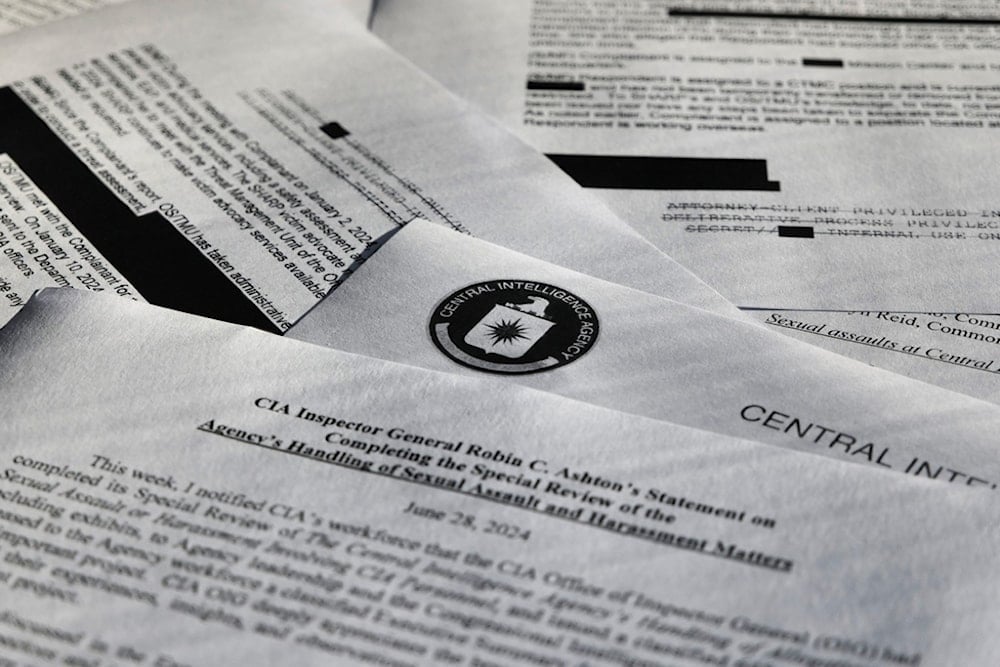CIA expanding intel gathering operations in Iran, China, DPRK
The US Central Intelligence Agency aims to make it easier for collaborators in several countries to tip them off in order to bolster their intelligence.
-

Documents related to a sexual assault case against a CIA officer are arranged for a photograph in New York on Tuesday, September 10, 2024. (AP)
The CIA has launched new initiatives to make it "easier" and "safe" for potential spies and collaborators in Iran, China, and the People's Democratic Republic of Korea (DPRK) to share sensitive information with the United States.
On Wednesday, the agency posted online guides in Farsi, Mandarin, and Korean, offering detailed instructions on how potential informants can securely contact US intelligence officers without risking exposure.
The CIA's guidelines emphasize secure communication, including through its public website and the darknet, a concealed part of the internet that requires special tools to access and provides anonymity for users. This expansion follows a similar campaign initiated in Russia two years ago, shortly after the start of the Ukraine war as part of efforts to gather intelligence on foreign adversaries.
The CIA has long been engaged in covert operations designed to undermine foreign governments that are considered adversarial to the US. The agency has often employed a wide range of tactics against governments all over the world, from clandestine support for dissidents and terrorist organizations to more direct interventions aimed at regime change.
The CIA, for example, played a pivotal role in orchestrating the 1953 coup in Iran against then-democratically elected Prime Minister Mohammad Mossadegh, re-establishing the pro-Western Shah's authority.
Similarly, US intelligence has maintained a keen interest in China, particularly in light of its growing economic and military influence. The CIA's efforts to gather intelligence on China have reportedly intensified in recent years as the country exponentially grows into a global superpower.
Moreover, the CIA has been adamant about gathering intelligence on the DPRK's nuclear weapons program, missile programs, and internal politics, making up notorious propaganda campaigns and spreading disinformation about the country and its domestic affairs.
Social media: A hub for spies
This goes in line with revelations made by former US State Department official Mike Benz during an interview with Tucker Carlson in late August, when he said the US government and the CIA utilize the social media platform Telegram to instigate riots and protest movements against international governments it deems undesirable.
Benz, who served under the Trump administration and is currently a free speech activist at the Foundation for Freedom Online, was asked by the American journalist about potential US involvement in the recent arrest of Telegram co-founder and CEO Pavel Durov in France earlier this week.
The former diplomat did not provide a direct answer to the question however, he noted that Durov's arrest aligned with "soft power" tactics the US has used in the past.
The former US official added that Telegram's encryption serves as a powerful feature of evading state control over media while enabling "US-funded political groups or dissidents to garner tens of thousands of supporters with relative impunity."
Benz stated that Telegram was the US' "main channel" for "effectively orchestrating a color revolution in Belarus" in 2020. He noted that "The National Endowment for Democracy (NED) was actually paying the main administrators of the Telegram channels that orchestrated those riots," adding that the NED was "one of the most prolific CIA cutouts in the arsenal."
The free speech activist highlighted that this practice is part of a long-running campaign used by the US, UK, and its NATO alliances in an attempt to gain political control over Russia's territories and resources.
Benz described Telegram as "the darling of the CIA, the State Department, and USAID" for allowing the orchestration of international political operations by the US due to its easy access for recruitment for the platform's billion users.

 4 Min Read
4 Min Read








